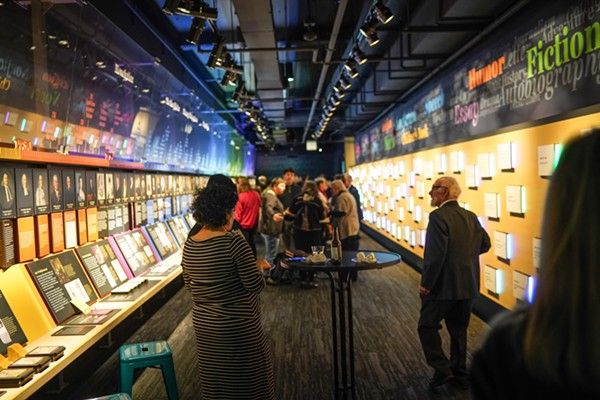For more stories about the effect of COVID-19 on museums, please visit the Prairie State Museums Project at PrairieStateMuseumsProject.org.
When you first walk into the American Writers Museum, you walk right into a timeline of American writers that spans more than 400 years. You take that long hallway to reach an open space often used for talks with authors debuting new books. Throughout each and every space, there’s something to learn—with great quotes from great writers like Octavia Butler lining the walls.
But since March, walking through those rooms hasn’t been an option. The museum, like others across the U.S., closed its doors as COVID-19 has changed our relationship with physical spaces. The museum, however, was quick to change with it, implementing new versions of exhibits and adding virtual events.
“We had been hoping to get to a point where we could put more of our content online,” says Carey Cranston, the American Writers Museum’s president, “when it became apparent that we were going to need to shut down. What I wanted to be able to do was to redirect our staff’s energies into projects that would keep people occupied.”
The museum’s “My America: Immigrant and Refugee Writers Today” exhibit, which explores the influence of modern immigrant and refugee writing, was created in 2019 to be an in-person, interactive experience. Because of how it was designed, it became the first exhibit that museum staff converted to online.
“There was so much rich content there, in video and and other materials, to sit down and scope out a way to put it online, to take the curriculum pieces we had for schools and make them available for download, and to just make it as interactive and engaging as possible in the spirit of the exhibit that we’d put together,” Cranston says.
The exhibit includes more than 30 writers from various immigrant backgrounds. In previously recorded content, the writers talk about their own experiences and answer questions about identity such as “Have you ever felt like an outsider?”
Misa Sugiura is one of those featured writers interviewed for the exhibit. She was born and raised near Chicago to parents from Japan, and is the author of two books: It’s Not Like It’s a Secret and This Time Will Be Different.
“I really loved the questions—that got me excited about the whole project,” Sugiura says, “this focus on what it means to be an American writer.”
Sugiura says the exhibit counteracts previous notions about whose voices get to be identified and seen as American.
“So many of these issues have come to the forefront in a way that they haven't before,” Sugiura says. “Now is a great time to take advantage of mainstream America's rising awareness of who we include and who we honor, who we believe to be worthwhile in our society, and who deserves a voice.”
In June, the museum rolled out a second virtual experience for another exhibit, “Frederick Douglass: Agitator.” In addition to transforming content from the original exhibit, in its online form, a descendant of Douglass joins writers, scholars, and activists in reading his 1845 memoir, Narrative of the Life of Frederick Douglass, an American Slave.
The museum’s reach and coverage is national—it opened in 2017 and is the first museum of its kind in the country.
The museum’s event calendar may have remained booked, but that national focus during COVID-19 brings additional challenges: the unknown safety of travel and canceled book tours. Although a virtual book talk gives the opportunity to introduce new works, it is still a very different experience for audiences—and book sales.
“When you bring in 100 people and have somebody in your space, the author comes in and [attendees] get their book signed afterwards, there's that interaction with the writer that's very personal and intimate,” Cranston says. “And that's something that we're not able to provide right now.”
For in-person author discussions, the museum partners with local bookstore Seminary Co-op to sell books. Now, it’s difficult to track resulting sales, but Cranston encourages book lovers to still support those authors and stores.
“When [readers buy books] from a local bookstore, they're supporting an institution that usually tries very hard to connect to their community and also may provide forums and opportunities for writers that wouldn't get them at a national scale,” Cranston says.
And to help museums, Cranston says consider buying memberships.
“We need it; we've definitely taken a hit from revenue,” Cranston says. “Because of COVID, we didn’t have our normal annual spring fundraiser. It's been tough on everybody.”
The American Writers Museum reopens this week for a limited number of visitors with modified safety precautions—to members on July 1 and then to the general public on July 3—but will continue to expand its online and interactive programming to include resources that schools can use next school year, including virtual field trips and guided tours. It will also convert its “American Voices” timeline exhibit into an online format for the fall.
“We're building those platforms right now because we recognize that even if schools are open, no school is going to put kids on a bus and bring them down to a museum until there's a vaccine,” Cranston says. “So this could be a long haul through into next year.”
COVID-19 Update: The connection between local and global issues–the Pulitzer Center's long standing mantra–has, sadly, never been more evident. We are uniquely positioned to serve the journalists, news media organizations, schools, and universities we partner with by continuing to advance our core mission: enabling great journalism and education about underreported and systemic issues that resonate now–and continue to have relevance in times ahead. We believe that this is a moment for decisive action. Learn more about the steps we are taking.
